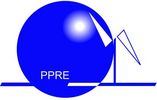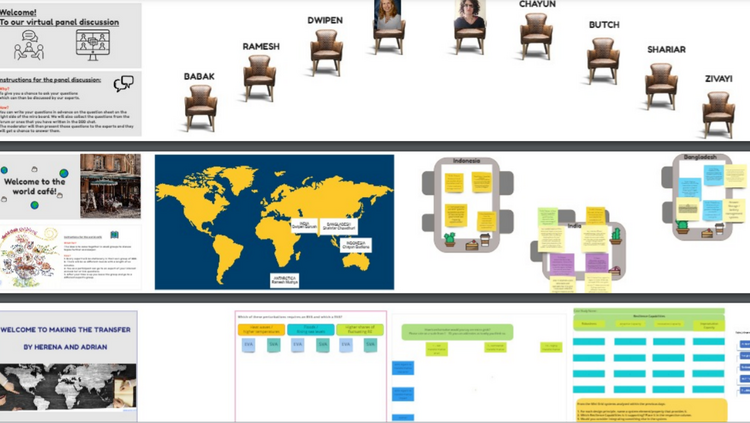- written by Jane Kariuki
In 2020, the team from the Postgraduate Programme Renewable Energy (PPRE) from the University of Oldenburg together with some of the students organized an online seminar on mini-grids in the global south: planning, implementation and future perspectives. As a follow up, another online seminar on the concepts, tools and the contribution of mini-grids and rural electrification to a resilient energy supply was conducted from 20th to 24th September 2021. The target group this time were the German Academic Exchange Service (DAAD) alumni and the focus was an introduction of resilience and how mini-grids can contribute to a resilient energy supply. This seminar was financed by the DAAD. Various activities were carried out during the seminar. More interactive tools were also used thus enabling the participants to be more involved in the sessions.
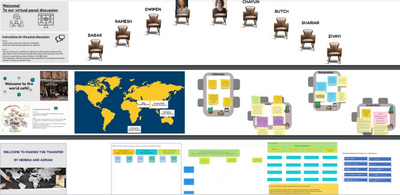
The Miro-Board - One of the interactive tools used in the online seminar
Due to the COVID-19 pandemic, the seminar could only be held online, however, the team worked tirelessly to ensure a more interactive session with the session chairs and some of the speakers addressing the audience from a live location in Oldenburg, Germany. The main focus of the seminar this time was to introduce the aspect of resilience and provide a greater insight to the participants on the role of mini-grids for a future sustainable and resilient power supply in developing countries. The future of mini-grids especially in developing countries where a large part of the population has no access to electricity continues to be a main topic of discussion. Therefore, this seminar was a great opportunity to learn more about mini-grids especially the factors taken into account when implementing a mini-grid and also some of the challenges faced. The technical aspects in implementation of mini-grids were discussed in detail and formed part of the focus of the seminar. As mentioned earlier, the seminar was mostly offered to DAAD alumni. However, PPRE and EMRE (European Master in Renewable Energy) students were welcome to join the seminar. There were about 82 participants in total. Based on the motivation which had been earlier sent by the participants it was quite clear that they were eager to learn about mini-grids in general, resilience and how it could be applied to mini-grids.
The key speakers – most of them PPRE alumni - had vast knowledge and years of experience in implementation of mini-grids in developing countries. They had mostly implemented mini-grids in the Asian and African continent and one in the Antarctica. The presentations were held continuously for one week from 08:00 - 16:30 Central European Time (CET). Ample time was allocated to each presenter for the presentation and Q&A session. There were also several breaks in between the presentations. There was a chair for each day to ensure that everything was carried out smoothly and according to the plan. Based on the request of the participants in the last seminar, the sessions were chaired by students from the PPRE program which was a good initiative as it gave the students a chance to be more involved in the seminar.
The technical aspects of mini-grids such as typical configurations of a solar-PV mini-grid, comparison of isolated and grid-tied mini-grids and some of the challenges faced on a mini-grid implemented in Antarctica where the Antarctic winds are considered to be too much were covered. An introduction to resilience was also carried out where the definition, its importance to renewable energy systems and challenges were clearly presented. The conceptual framework and principles for a social-ecological transformation were discussed in length. It was seen that initiatives such as Fridays For Future can lead to transformations by addressing the incumbent paradigms such as materialistic culture and growth, control and autonomy of humans over nature and the expert knowledge at the macro level.
A panel discussion which encompassed of key speakers with a vast experience in implementation of mini-grids in different continents such as Africa, Asia and Antarctica was also held. The panel discussion gave the audience a chance to ask questions and seek clarifications on the presentations which had been conducted the day before. It enabled the panelists as well as the audience to dive deeper into the technicalities that are involved in implementation of mini-grids. It also gave a good foundation for the presentations and discussions in the subsequent days.
Fishbowl conversations are used as an avenue for providing an opportunity for an entire group of people to participate in a discussion. In this case it was an open fishbowl where at any one time any of the participants could join the fishbowl and continue the discussion. This concept was used to gain a deeper understanding on resilience and how mini-grids can contribute. The impact of the methodologies used in the transformation to a climate-neutral energy system was one of the key points of discussion in the fishbowl discussion.
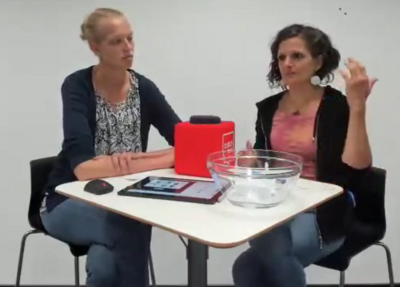
Dr. Herena Torio and Leonora Posega during the fishbowl discussion
Towards the end of the seminar, two software were introduced to the participants: MicroPower Manager and Homer Pro. In the case of MicroPower Manager, the software could be used online whereas for Homer Pro a free trial could be downloaded and installed. A step by step procedure on the design and simulation of a small mini-grid was carried out in the Homer Pro software and therefore, the participants were able to gain some practical experience.
In order to gain an in-depth knowledge on certain topics discussed in the seminar, two case studies were selected for further discussion and development: Community Owned Mini-Grid in San
Rafael, Colombia and MicroPower Manager. These discussions and presentations were carried out for a period of about one month and a summary was given in form of a poster which would later be used at the off-grid expo held in Augsburg, Germany, from 1st to 3rd December 2021.
As we continue to navigate through a world hit hard by a pandemic, we are also learning and adapting to the changes. This time, the online seminar was much more interactive as compared to the previous online seminar. The use of more tools such as the Miro board, Mentimeter, Picker Wheel, Big Blue Button etc. enabled the participants to actively participate in the seminar. The live presence of the planning team at a central location not only made the co-ordination process much easier but also had a huge impact on making the sessions more lively and energetic. Overall, the workshop proved to be quite successful. Based on the feedback, the participants’ expectations were met and they were more than impressed with the content and discussion.
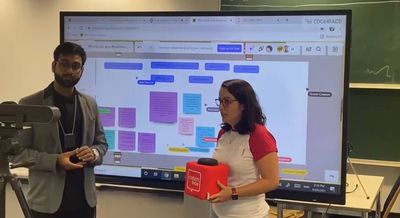
Maria Fernanda Davila and Aliqyaan Sakarwala during the seminar feedback session
We look forward to hopefully having a face-to-face seminar next time!
The speakers
- Chayun Budiono, Indonesia
- Dwipen Boruah, Global Sustainable Energy Solutions, India
- Shahriar Chowdhuri, United International University, Bangladesh
- Babak Ravanbach, DLR Institute for Networked Energy Systems, Germany
- Zivayi Chiguvare, University of Namibia
- Ramesh Muthya, India
- Adrián Jimenez & Dr. Herena Torío, University of Oldenburg, Germany
- Stefanie Sievers-Glotzbach & Julia Tschersich, University of Oldenburg, Germany
- Willington Ortiz, Wuppertal Institut, Germany
- Monica Gutierrez, Apü Üya Wüin, Colombia
- Dipta Majumder, INENSUS GmbH. Germany
- Mohamed Mamdouh Elkadragy, Battery Storage Expert, Germany
The organizers
The workshop organizers were:
- Dr. Herena Torío, Germany – The Team leader, she led the team to ensure success of the seminar.
- Andreas Günther, Germany – Responsible for coordinating the activities.
- Maria Fernanda Davila, Colombia – Responsible for managing the speakers and content of the presentations.
- Leonora Posega, Germany – Responsible for the framework and design concepts of the seminar.
- Samuel Cudjoe, Ghana – Offered technical assistance.
- Aliqyaan Sakarwala, India – Responsible for creating of the website and other software technicalities.
- Jane Kariuki, Kenya – Responsible for communication with the participants.

